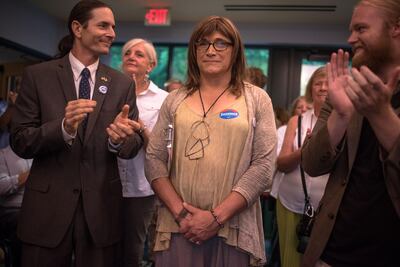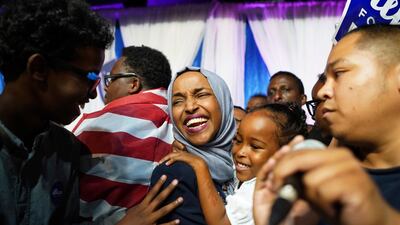The United States’ first transgender governor, a huge influx of female representatives and the first Somali-American woman in Congress all came a step closer to office in this week’s primary elections.
The results illustrate how Democrats are embracing diversity as they prepare for the midterms in November. Many are treating the elections as a referendum on Donald Trump's vision of America and US identity, according to analysis from five states.
Hank Sheinkopf, a veteran political consultant, said the Democrats had boosted their midterm chances by picking candidates who reflected the demographics of their communities.
“That makes them much harder to attack,” he said.
In Minnesota – where turnout surpassed a two-decade high and which is home to the country’s largest Somali community – that meant selecting Ilhan Omar, a Somali-American who arrived as a refugee.
Her seat is a Democratic shoo-in and this would put her on course to become one of the first Muslim women to be elected to Congress (along with Palestinian-American Rashida Tlaib, who won her primary in Detroit last week).
Ms Omar spent four years of her childhood in a Kenyan refugee camp before coming to the US, an experience she used in her campaign.
______________
Read more:
Rashida Tlaib on course to become first Muslim American Woman in Congress
US politics swept by 'Blue Muslim wave'
Trump casts midterm elections as a personal referendum
______________
She has spoken out against Mr Trump's ban on arrivals from predominantly Muslim countries, in a state that he targeted in his 2016 campaign when he said Somali migrants were a "disaster" for Minnesota.
“In a time when those seeking safety, asylum and opportunity are being attacked, my lived experience will bring a perspective that has never been given a seat at the table,” she told voters.
Elsewhere, Democrats in Vermont selected Christine Hallquist as their candidate for governor, making her the first transgender candidate to win a major party nomination for a governorship or statewide office of any kind.

She defeated three other candidates and will stand in November against Phil Scott, the Republican incumbent, for a state that Democrats are confident of winning.
Ms Hallquist told CNN that her run was inspired by Mr Trump’s election and what she described as systematic attacks on minority communities.
“People like myself and who normally wouldn't be in politics are rising up all over and I think that's what healthy democracy looks like,” she said.
“I'm hoping that years from now we can look back and say, ‘Isn’t American democracy wonderful: we survived a death spot.’”
Her selection marked a milestone. Democrats have picked a lesbian, gay, bisexual and now a transgender candidate for governorships across the country, spelling out the letters in the acronym LGBT, as pointed out by Chris Johnson of the Washington Blade newspaper.
Ten states have yet to select their candidates for November's general election. While the full political battle lines are not quite finalised, both sides know what is at stake.
Democrats need to snatch 23 seats from the Republicans to take control of the House of Representatives. A majority there would allow them to start impeachment proceedings against Mr Trump.
With the midterm odds in any year generally stacked against the president’s party, even with a less polarising commander-in-chief, Mr Sheinkopf said it was the Democrats’ election to lose.
He said that Democrats had selected an overall slate of more traditionally centrist, blue-collar candidates, even as many of the headlines continued to be dominated by the rise of socialist followers of Bernie Sanders.
That still left the traditional Democratic problem of staying unified in the run-up to November’s midterms.
“The best thing they have going for them is Donald Trump,” he said.
His influence is credited with driving high turnout. In all four states with elections – Minnesota, Connecticut, Vermont and Wisconsin – Democrats heavily outnumbered Republicans by up to a quarter of a million in the statewide Minnesota vote.
The president has also inspired record numbers of women to run. So far, there are 476 women candidates, according to a tally by the Centre for American Women in Politics at Rutgers University. The previous highest level was 298 in 2012. Some 272 are still in the running.
Similar records have also been set for the Senate, with 54 candidates – of which 29 are still in the hunt — and for gubernatorial races, with 62 candidates.
Analysts said Mr Trump’s offensive comments were responsible.
"In past years, a lot of political consultants, members of the media have looked at being a woman as a potential disadvantage, something you had to overcome," said Delaney Skinner, a Democratic strategist working with women congressional candidates.
Now, consultants believe many voters will be motivated to push back against the president.
“It's a real advantage to running as a woman this year,” she said.

